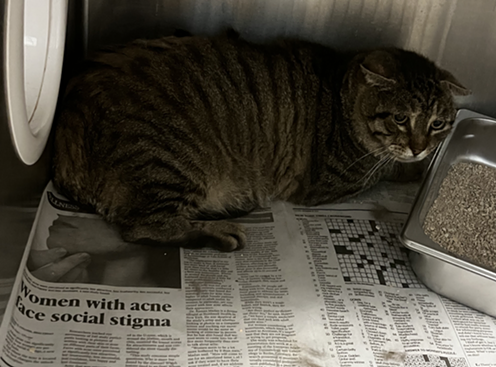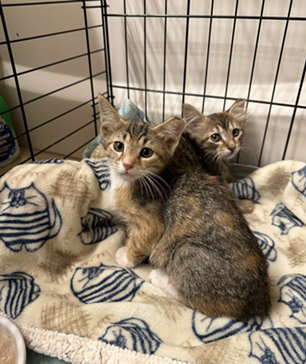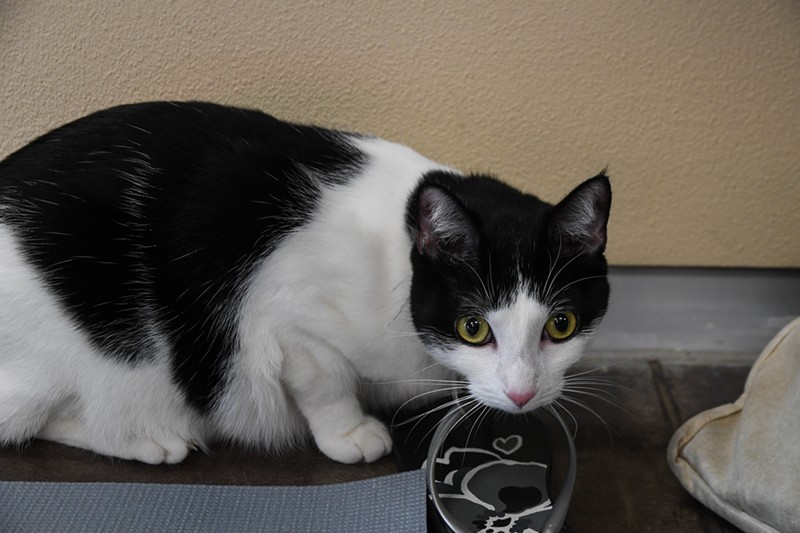Scrolling through the Arlington Animal Shelter’s list of adoptable pets reveals dozens of cats — most of them kittens — waiting for homes. One kitten, less than 2 months old and speckled with brown and black markings, is pictured on the website with one eye nearly swollen shut.
It is the latest evidence of Arlington Animal Services' long history of “doing cats dirty,” says Lisa Dennis, who started the group Cats in the Cliff to help with trap-neuter-return (TNR) efforts in North Texas. After years of working with cats, she says she knows an eye infection when she sees one, but recent experiences with the Arlington shelter have left her doubtful the kitten is receiving care for the illness.
While Dennis primarily handles feral and stray cats, she recently took in a cat that, after 10 days in the Arlington shelter, needed to be euthanized because of a severe feline immunodeficiency virus (FIV) infection. The shelter never tested the cat, whom she dubbed Otto, for the virus, Dennis told the Observer, despite it being a routine and inexpensive test.
“He came in and his little eyes were so beautiful. He was a chubby little guy, a community cat. … He'd been TNR'd, so he was just living his life,” Dennis said. “He had the sad misfortune of being picked up by [Arlington Animal Services.]”

A spokesperson for Arlington Animal Services told the Observer that Otto was not tested for FIV because he did not present any symptoms of illness during a 10-day quarantine period that began after the cat entered the shelter and ended July 18. During that time, staff conducted "twice daily observations." By July 19, Otto had developed "crust around the eyes" and lethargy, the spokesperson said, and a rescue organization was contacted to pick him up.
Dennis collected Otto from the shelter on July 19, and photos shared with the Observer show his eyes were caked with gunk. Additionally, Dennis said he was breathing heavily out of his mouth and would not eat. The next day, a veterinarian advised Dennis that putting the cat down was the best course of action, after which she turned to the shelter for answers.
In communications shared with the Observer, a shelter representative told Dennis there was no record of Otto ever being taken in or adopted out.
“I would love to help provide accurate and transparent information, but we do not believe this cat was ever in our care,” the employee told Dennis, who responded by sharing the cat’s adoption paperwork.
Later, the animal shelter’s facebook account posted they were “investigating the situation surrounding” Otto’s illness, and shared Dennis’ concerns. (The shelter representative also told Dennis the kitten pictured with a hurt eye is receiving treatment prescribed by a veterinarian who is contracted by the shelter to work several days a week.)
The spokesperson said that respiratory illnesses like the one Otto was diagnosed with are "not uncommon" in large shelters.
A Trend of Turnouts
Debbie McClendon volunteered with the Arlington Animal Shelter for 11 years, during which time she prided herself on her care for cats. In 2013, she petitioned the Arlington City Council to approve a TNR program, which promotes the trapping of feral cats so they can be neutered before being returned to where they were found. In recent years, though, the shelter has shifted from the practices she remembers being standard during her time as a volunteer.
Last summer, the rescue McClendon is a part of, Buddies Place Cat Rescue, was made aware of a mother and four kittens that had been brought into the shelter as part of the TNR program. While the mother cat was feral, the four kittens had “barely opened their eyes,” and were friendly and adoptable, McClendon said. Once they were large enough to be neutered, though, the shelter returned the kittens to the streets.
“He came in and his little eyes were so beautiful. He was a chubby little guy. ... He had the sad misfortune of being picked up by [Arlington Animal Services.]” — Lisa Dennis, Cats in the Cliff
tweet this
“It had been 42 days in an air-conditioned environment where they were given food and water by this shelter every day. They had never had to hunt for food before because they were nursing babies when they came in,” McClendon said. “So they spayed them on the 26th of June. On the 27th of June, they released them. It was 106 degrees that day.”
When McClendon and other members of Buddies Place asked the shelter where the kittens had been dropped, they were given three different locations. The shelter said the kittens were released because they were feral, but after the rescue located the kittens a day later, McClendon noted their docile nature. She pulled the kittens out of a gutter and, after nursing them for several more weeks, was able to adopt them out in pairs.
Because temperament assessments are done in the shelter where animals often exhibit symptoms of stress, "it is possible" the kittens later displayed friendlier traits, the shelter added.

"At the time that these kittens were released, Arlington Animal Services had 55 total kittens, with 30 of them awaiting rescue due to their age/behavior," the spokesperson said. "There simply was not room at the shelter to continue to keep these kittens. The Arlington Animal Services staff was faced with the decision to euthanize the kittens or release them."
What happened to “Debbie’s kittens” is a trend, says Lisa Allen, a cat rescuer who volunteered with the Arlington shelter for two years. Also last summer, Allen beseeched the shelter to share the location of five kittens who were neutered then released into the summer heat. Emails shared with the Observer show Allen’s “devastation” after being unable to find the 2-pound cats; many of her emails went unanswered by shelter staff.
“I emailed the shelter manager begging to know where they released them,” Allen told the Observer. “I got at least three different addresses and none of them were correct. They sent me on a wild goose chase. I drove around multiple times a day for months looking for them.”
The worst part of the experience, other than the fact that the kittens were never found, was that she was “unable to get anyone to care,” Allen said.
A spokesperson for the shelter said cats receive regular veterinary care and are fed twice daily.












